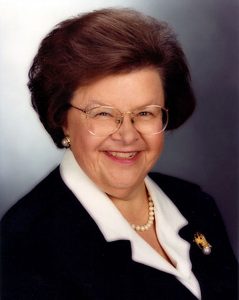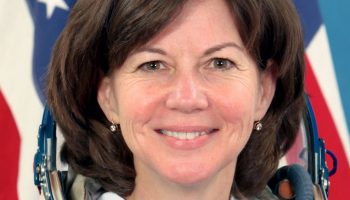
In New York state, in preparation for the 2018 U.S. general election, official postcards with polling location information arrived in the mail this summer. Candidate mailings for the Sept. 13 state primary election and the No.6 general election will soon follow.
In recent elections, voters in some states, including Montana and Wisconsin, received postcards of mysterious origin containing false, lurid statements trashing Democratic and Republican candidates three to 30 days prior to elections.
The Nov. 6 general election will be the second in which the name Barbara A. Mikulski — longest-serving woman in Congressional history, longest-serving senator from Maryland and first female chair of the Senate Appropriations Committee — will not appear on the ballot in Maryland.
At 2 p.m. Saturday, August 11, in the Hall of Philosophy, Mikulski will deliver an address that is directly relevant to the issue of freedom of speech and expression. It is titled, “The First of Many: Building a Zone of Civility.”
Having run in and won 17 of 18 elections since 1970 — enabling her to serve in the Baltimore City Council for five years, represent Maryland’s 3rd District in the U.S. House of Representatives for 10 years (five two-year terms) and represent the state of Maryland in the U.S. Senate for 30 years (five six-year terms) — Mikulski became a seasoned campaigner.
Her perspectives about change over time in public discourse while she was campaigning, participating fully in high-level government decision-making after winning elections, and advising academic scholars and students about government after retiring from the U.S. Senate in January 2017, are particularly well-grounded.
The last year in which Mikulski ran for election was 2010. The U.S. Supreme Court decided the landmark case, Citizens United v. Federal Election Commission in January of that year.
This will be the fourth general election since the Citizens United decision. By a 5-4 vote, the Supreme Court held that the free speech clause of the Constitution’s First Amendment allows independent and indirect contributions to political parties and candidate campaigns by for-profit corporations, not-for-profit organizations, labor unions, and other associations.
Some of the democracy-challenging ramifications of the Citizens United decision are depicted in the award-winning 2018 documentary “Dark Money.” This film examines the influence of largely untraceable corporate funding on state elections and elected officials — judges included. It also raises concerns about untraceable foreign funding.
Chautauqua Cinema hosted two Meet the Filmmaker screenings of “Dark Money” on Monday, followed by discussions led by filmmaker, Kimberly Reed.
In her December 2016 “summing-up speech” on the floor of the U.S. Senate, Mikulski called for a return to civility in politics. Known in the Senate as the “Dean of the Women,” she was a mentor to newly elected women Senators and built coalitions of women who worked together “to get things done.”
Upon retiring from the Senate, Mikulski — who majored in sociology at Mount Saint Agnes College and earned her master’s degree in social work at the University of Maryland — began the next phase of her career as the Homewood Professor of Political Science and adviser to President Ronald J. Daniels at Johns Hopkins University.
A recipient of the highest civilian award in the United States in 2015, the Presidential Medal of Freedom, she has also been speaking nationally about leadership, innovation, advocacy an women’s empowerment.
More than 25 years ago, Mikulski and Republican Sen. Kay Bailey Hutchison initiated regular dinner meetings for women senators.
“Our agreement was to do legislating with intellectual rigor, civility, and open debate, and when it was over, we would still be friends,” Mikulski said.
Initially she and Hutchison focused on mammograms.
“There were no national mammogram standards,” Mikulski said. “In some offices they used a TB machine. There was also the question of radiation. We introduced legislation and had the full support of all the women and many fine men. It passed.”
Consequently, “now a woman knows that the mammogram in the (medical) office is safe and effective,” she continued. “The workers, too. … One of the earliest companies to meet the FDA (Food and Drug Administration) standards was GE (General Electric). They made mammograms far more desirable to sell around the world. They saved lives, protected workers, and resulted in jobs in our own country.”
For Mikulski, “the first acts of citizenship” are registering to vote, voting and making sure one’s family does likewise.
“I’m pretty sure the largest voting block is ‘no show,’ ” she said. “In order to make democracy work, we have to work at democracy.”
Working within one’s community is another important act of citizenship.
“I’m a big believer in education from K through 12, as well as civic engagement,” Mikulski said. “Be a lifelong learner and a lifelong participant in your community. … Everyone can do something.”
Before joining the Baltimore City Council in 1971, she served as a social worker and as a community organizer and activist who successfully opposed the construction of a 16-lane highway — Interstate 95 — through two Baltimore neighborhoods. Her efforts saved Baltimore’s Inner Harbor and Fells Point. Consequently, they are thriving residential and commercial communities.
For the candidates who win their races this November, Mikulski’s advice is as follows: “When you win, … view yourself as a champion of the people. You need to take what you learned from listening to the people before and on the campaign. Learn from the people, including academia, business and nonprofits. The best ideas will always come from them.”




